“So, what can we do to turn things around?” The question was asked in the first session at Socialist Alternative’s annual Union Activism and History Conference, held at Trades Hall in Melbourne on 14 October. More than 230 unionists and socialists spent the day addressing elements of that question, over 14 sessions.
With 86 percent of workers in Australia not members of a union, a big part of the answer has to be: organising the unorganised. One of the highlights of the day was the session presented by farm worker organisers from the National Union of Workers. By organising migrant farm workers on a bewildering variety of visas, and enforcing legal minimums in an industry dominated by cash in hand payments and shonky bosses, this organising drive demonstrates in practice what the rest of our movement has to start doing on a large scale.
Mick Lewis, a veteran of the militant Builders Labourers’ Federation, gave an electrifying talk on the role of the union in the world famous “green bans”, in which construction workers used their industrial power to preserve parkland and historic buildings. Mick recounted being won to communism by legendary BLF leader Norm Wallace among others, and sticking to this militant world view through fights over wages, working conditions and wider political issues including the Vietnam War.
This role of uncompromising working class politics as a guide to action came up in a series of sessions. The importance of unions standing up against oppression featured in the session on building the “yes” vote for same sex marriage, with stories from rail, warehousing and construction, as well as some of the hidden history of workers standing up against homophobia.
Any sustained union revival will involve significant strikes. Several sessions were dedicated to drawing the lessons from some of the great upsurges of our movement, including the extraordinary 1917 NSW general strike, the epic 16-month coal lockout around Newcastle in 1929-30, and the colossal upsurge of the US working class in the 1930s.
General lessons are invaluable, but any militant has to work out how to apply them in a particular environment. A series of sessions on specific industries – education, the media and disability – involved discussions about the challenges of organising in changing industries.
Perhaps no-one came away with a glib five-point miracle cure for the challenges facing our movement. But everyone gained a better idea of the political and industrial traditions we can draw on to answer in practice that vital opening question: “What can we do to turn things around?”











